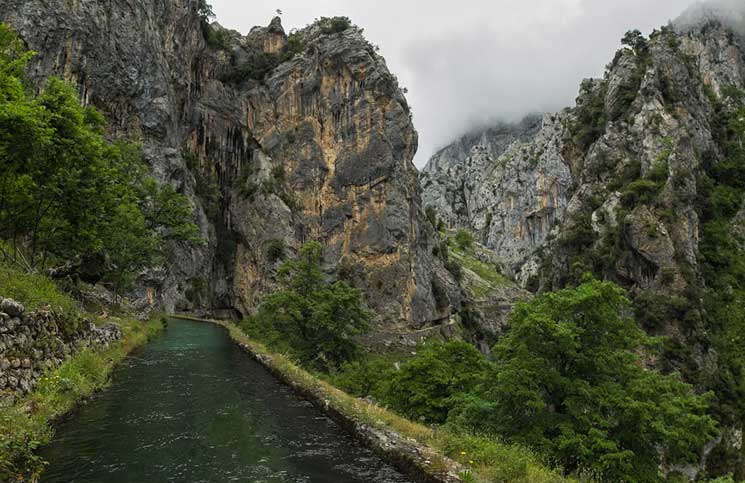At the heart of Picos de Europa National Park in northern Spain, an adventure awaits hikers. The trail consists of 9 miles along the Cares River and the Cares Gorge, aka “divine gorge.” Steep cliffs stretch up over 6,500 ft (2,000 m) on one side and the Cares River is as far as 650 feet (200 m) below in the deep gorge. The Cares Gorge trail is extremely popular because it is considered one of the most beautiful walks in all of Spain. The footpath was improved about 60 years ago when tunnels were carved into the mountain to serve as a maintenance trail to a hydroelectric power station. Long ago, some sections of the path were used by shepherds, sheep and even goats; the route provided the only communication between 2 villages when it was snowy. The national park was also named a biosphere reserve by UNESCO. If you visit Spain, you might want to reserve a day to trek this beautiful trail.

Look beyond the water, Cares Chanel or Canal del Cares, and then up at the narrow pathways carved into stone to see one of the most beautiful hiking adventures in Spain. This trek is along the Cares River and through the Cares Gorge in Picos de Europa National Park. The Cares Gorge has many names like “Divine Gorge” or Garganta del Cares, but everyone agrees on its rugged beauty. Photo #1 by David Valije

Care Gorge Route: Narrow paths with steep cliffs stretching up over 6,500 ft (2,000 m) on one side and the Cares River far below on the other side. Photo #2 by Raúl González

Walk on the wild side, Cares Gorge in Spain. Part of the footpath was once nothing more than a goat trail, traveled by animals and shepherds long ago. This ancient route provided the only communication between the villages of Caín (León) and Poncebos (Asturias) during snowy winters. In the 1940s, the electricity company Viesgo carved a trail high up into the craggy gorge walls; it was a maintenance path to service the Poncebos hydroelectric canal that runs between Cain and Camarmena along the Cares River. Photo #3 by Jose Luis Canales

Cares River Route in the heart of Picos de Europa National Park is 9.321 miles (15 km) long one way. The walk takes an estimated 3 to 4 hours one way, or 6 to 8 round trip. Photo #4 by Max Westby

Today people can appreciate the trek with gorgeous landscapes, but many men lost their lives while digging into limestone rocks to create the Cares Route, or Ruta del Cares. Photo #5 by Jose Luis Canale

Crowds walk the path through Cares Gorge. It is advised not to take the route “during the month of August or summer during the weekend due to the large crowds that occur.” Photo #6 by _Lares

People with vertigo may not want to take the “La garganta divina (Asturias – León)” hike, but everyone should bring plenty of water to stay hydrated as there is not much shade. The footpath is about 8 feet wide in places, but all adventurers should keep an eye out as rock-slides are always possible. Photo #7 by Raúl González

Abandoned buildings along Cares Gorge trail. Photo #8 by Erik Daugaard

If you go early and avoid weekends, holidays and summer, you might be like this lone hiker on the route? Yet spring and autumn are noted to be the most beautiful times of the year to make the trek. Photo #9 by Ramón Pérez Niz

A rainbow over the Cares Gorge. The route is free of charge and open all year round, but can be tricky if there is snow near the village of Cain. Walkers should be alert for possible falling rocks when it snows, rains heavily, or during the “thaw.” Photo #10 by Asociación Anciles

Adventure at Garganta del Cares. Paraphrasing this Hiking in Spain book: Despite this classic Picos walk being almost too popular, it’s earned this popularity for a very good reason. It’s well worth braving the maddening crowds to get a piece of the action. The walk, though long, is easy and is undertaken by all ages and walking abilities. Photo #11 by Senderismo Sermar

The photographer noted, “In the Asturian part of the Ruta del Cares, a few meters from the border with León, I found this natural setting :-)” Photo #12 by Jorge Cabrera

Picos de Europa National Park in northern Spain was created in 1918. In 2003, UNESCO approved Biosphere Reserve status for the National Park. Photo #13 by ccdoh1

Looking treacherous at this point of the 9 miles of natural beauty between the towns of Leon and Poncebos Cain in Asturias, Spain. Photo #14 by Erik Daugaard

“Somewhat complicated,” wrote the photographer. There are some places along the gorge route where the river is 650 feet (200 meters) below. Photo #15 by Ramón Pérez Niz

Trickling water at Garganta del Cares. Although many people choose to start the trail in Caín and end in Poncebos, adventurers can start the walk from either town or hike to one and round trip back again. Photo #16 by Ramón Pérez Niz

Hikers on “The Divine Gorge” route. The Cares canal was built between 1916 and 1921, but it took another couple decades before a footpath was carved through the limestone as a maintenance path for a hydroelectric dam. Photo #17 by Erik Daugaard

Walkopedia scores Cares Gorge (Garganta del Cares) as an 87 mostly for its beauty, but “crowded at high season and at weekends” was a noted negative. Photo #18 by Senderismo Sermar

Tunnels carved through the mountains. Photo #19 by Erik Daugaard

Hiking trail at Garganta del Cares. Photo #20 by Jose Luis Canales

Sign about improvements to the Cares Route aka the divine gorge. Photo #21 by Erik Daugaard

Head lamps are worn during some of the Cares Gorge guided tours. Photo #22 by Ronnie Macdonald & #23 by Erik Daugaard

Waterfalls along Garganta del Cares. Photo #24 by Senderismo Sermar

Wooden footpath on Cares Gorge Route. Photo #25 by Senderismo Sermar

Sheep seen while hiking along the divine gorge, Ruta Del Cares. About 1,300 people live in Picos de Europa National Park. Photo #26 by Senderismo Sermar

Rushing rapids at Cares Gorge. As a biosphere reserve, the national park and Cares Gorge will remain mostly untouched by modernization. A hiking magazine suggested bringing along your cell phone even though you won’t have a signal for the entire hike. Photo #27 by Ronnie Macdonald

Cares Gorge, river and trail. Photo #28 by Ramón Pérez Niz

Trees jutting out of a rock formation along Ruta del Cares. Photo #29 by Erik Daugaard

During the holidays and summer, the trail is traversed by thousands of people as if it were part of a main street in a big city instead of miles of trail out in nature. Photo #30 by ccdoh1

Cares Gorge Fauna, Picos de Europa. The photographer added, “Don’t annoy the natives!” There were quite a lot of goat photos along the route, some noted to take care if goats above you on the rocky mountains are descending as this too could potentially cause falling rocks. Photo #31 by NicolaJH

This beautiful route in the national park has hanging bridges, waterfalls, tunnels and caves. Photo #32 by Jorge Cabrera

There’s an interactive map showing the bridges and tunnels along Cares Gorge trail. Photo #33 by Erik Daugaard

According to Wikipedia, “The Cares is known because of the narrow and spectacular canyon it forms when passing the Asturian Massif, there is a famous trekking path known as ‘Ruta del Cares’ that runs along the river, being one of the most remarkable Asturian geographical attractions. The Cares river is also known because of the quality of its salmon.” Photo #34 by Ramón Pérez Niz

Cares Gorge (Garganta del Cares) footpath, Picos de Europa National Park, Castilla y Leon, Spain. Photo #35 by rolando000 / Bing

Wildlife at Cares Gorge trail. Photo #36 by Jesus Rubio García

Absolutely stunning limestone gorge. Photo #37 by Max Westby

Peaks of Europe, Picu Uriellu, Naranjo de Bulnes. Photo #38 by Evölah
















